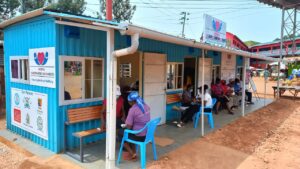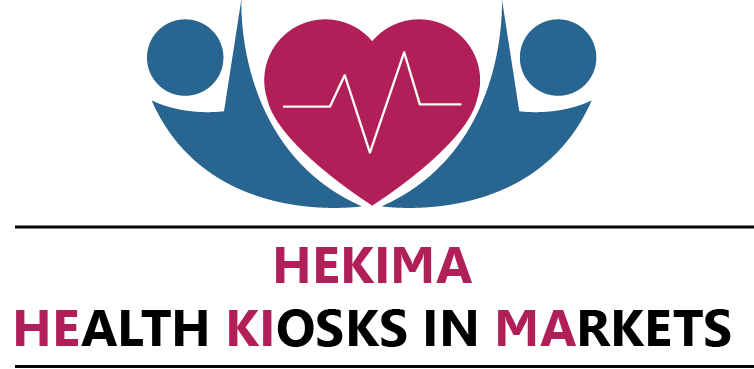
PROMOTING HEALTH AND WELLBEING
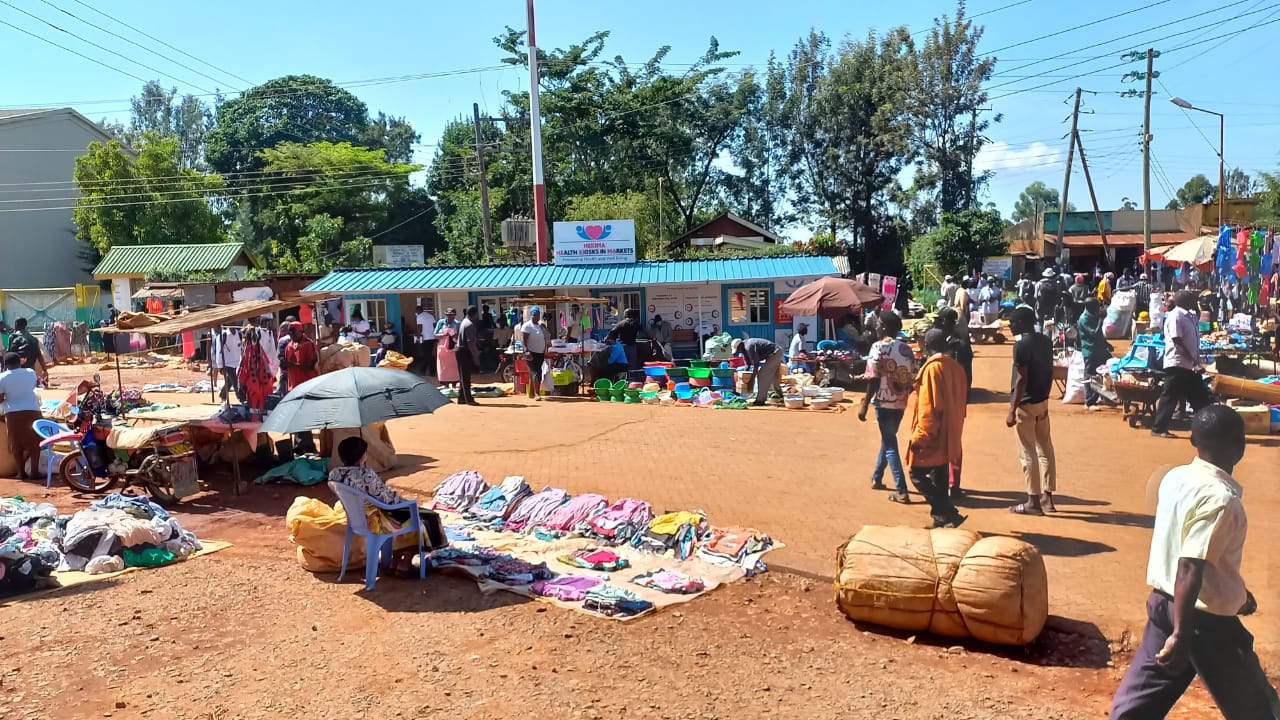
The Health Kiosks in MArkets (HEKIMA) study was developed by researchers at the Kenya Medical Research Institute, King’s College London, University of Nairobi, Moi University and Strathmore University in collaboration with the county leadership, health workers, market traders and patient representatives in Vihiga County, Kenya. Hekima is a market-focused health initiative that seeks to improve access to health promotion services for the prevention of heart disease.
The Problem
Heart (cardiovascular) disease is a leading cause of death in Kenya. Rural communities and those with lower socio-economic status face difficulties in accessing health services; as a result they are less likely to go for checks-ups and remain vulnerable to the onset of cardiovascular disease.
The HEKIMA Approach
Community markets are social establishments with untapped potential to promote public health and interventions. A central locus of life in the rural areas, they are a gathering point for people of all ages and backgrounds. Locating health kiosks in such a trusted community asset is thought to increase the likelihood of successful uptake of health promotion by vulnerable members of society.
Aim of the Study
The study explores whether kiosks in community markets, manned by community health workers (CHWs) and supervised by nurses, can support prevention of heart diseases in Kenya.
Study Overview
The study is being implemented in 4 phases to understand 2 critical issues
The local context in which the study is being implemented
The research team involved the county leadership early on in the research process, during development of the concept. Their in-depth knowledge of the county provided the research team an understanding of the make up of establishments such as community markets and their potential as convergence points for the community. A physical assessment of the health infrastructure and community markets in Vihiga was done to assess the level of preparedness for the kiosks as an interface between the health system and the community. Through consultative and consensus building workshops, the research team together with the county leadership, health workers, market traders and patient representatives identified the key features of, opportunities and likely obstacles to the successful roll out of the health kiosks.
The recommendations of the community were used to design and deploy two health kiosks in two community markets. This included adapting the training of the community health workers (CHWs) and the nurses who supervised them to better suit the prospective clients’ needs and expectations as identified by the community. The CHWs have for the past 12 months conducted screening for conditions such as obesity, high blood pressure and diabetes which raise the risk of developing cardiovascular disease and provided health promotion talks with referrals to primary care for people requiring treatment.
How the kiosks operate in the real- world setting of the community market.
Throughout the study period, the research team carried out an evaluation of how services were provided in the health kiosks. This was to enable an in-depth understanding of the practicalities of providing services and the adjustments that were made in response to the realities on the ground. This will be compared against the original operations plan prepared at the beginning of the study, and used to make modifications to ease installation of more kiosks in future.
Find out more: kemri.go.ke/hekima-technical-summary/
Funding

Partners

The novelty of the intervention design required co-operation between principally the health and trade sectors, which were not previously (ordinarily) linked in Vihiga county. This created an added layer of complexity to the intervention. It was therefore crucial to develop a clear understanding of the context in which the intervention would be implemented. This cut across various dimensions including organisational arrangements within each sector, the policy, social, and economic environment in which the kiosks would operate and consideration of how these factors could help or hinder successful implementation.
The journey to building partnership with the community in Vihiga began early on. Engagement with the county health sector leadership established support for the grant application, as the proposed study was aligned with Vihiga’s health priorities and strategic plan. This early engagement later facilitated access to the county’s network of health facilities and community markets, health workers, market traders and identification of additional stakeholders.
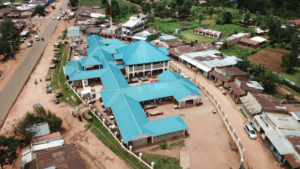
An aerial view of Mudete market
Socio-cultural context
Observations in community markets were conducted, the goal being to gain an understanding of the socio-cultural context of community markets and the potential interplay with the health kiosk as a new ‘entrant’ into the market setting. The level of interaction and connectedness among market traders, buyers and other people found within markets varied both with the size and level of activity in the particular market and potential points of leverage and resistance were identified.
The study team conducted a physical assessment of health centers, which are the primary care centres within the county health system. The potential and actual capacity to provide NCD prevention and control services, and potential for collaboration with community markets was assessed for each health centre visited.
Community markets were assessed to understand their organisational structure, ongoing activities outside those typically associated with business such as social and welfare groups and establish the existence of health promotion activities. This was restricted to markets within a 5km radius of the nearest health centre, to follow health sector guidance on acceptable access to health facilities.
An understanding of the operating environment in trade and health as the two major sectors interfacing on the study was gained.
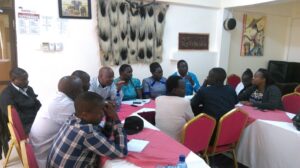 A workshop was convened with a diverse representation of people who would impact or with the potential to impact on the health kiosks. This included market traders, patient representatives, religious leaders, leadership of markets, frontline and management-level health workers, and local NGOs
A workshop was convened with a diverse representation of people who would impact or with the potential to impact on the health kiosks. This included market traders, patient representatives, religious leaders, leadership of markets, frontline and management-level health workers, and local NGOs
Reaching consensus with such varied sources of opinion required innovation. The research team used the group concept mapping method. During a concept mapping workshop, facilitators led brainstorming around 3 prompt questions, the sum of which enabled participants to then consider and individually express their vision and aspirations for the kiosks’ physical structure, operations, quality of service criteria and possible barriers and facilitators to their achievement. Following this, through a sorting and rating exercise, they were able to collectively identify important and feasible actions to start off implementation.
The hekima kiosk intervention was co-developed with the community right from inception. The conceptulization, development, implementation and monitoring have all had active and sustained input from the community.
The knowledge gained in the process of building partnerships, observing the markets and concept mapping enabled the research team identify contextual factors likely to influence the creation and use of health kiosks in markets as a system interface between the community and primary healthcare system and address them accordingly in the implementation strategies .
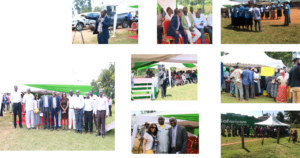
The study was officially launched by the Vihiga County Deputy Governor Dr G. Asisi representing the County Governor, H.E. Dr. Wilber Ottichilo in Mudete Market in Sabatia Sub-County, Vihiga on 15th August 2019. In attendance was Dr. Evans Amukoye, Director Research Administration representing Director General KEMRI, County Directors of Health, County Trade representatives, sub-county NCD coordinators, market champions and health care workers among others. Approximately 400 people attended the launch ceremony, 300 of whom were screened for high blood pressure and diabetes.
It was an inspiring event, with the CHWs singing a song they developed for ‘HEKIMA’. With the assistance of the KEMRI corporate communications department the event was broadcasted live on national television
Building partnerships for success
Both formal and informal engagements were held to establish the community needs and viability of the research idea. The outcome informed the funding application and protocol development.
Participatory approaches are key in understanding the governance and practicalities in undertaking complex interventions. HEKIMA used this approach in identifying whom to work with, getting the buy-in and good will; and in sensitizing and mobilizing communities, healthcare workers, the market leadership and administration. The project has both local and global advisory groups to provide stewardship over operational and scientific aspects of implementation respectively. The membership of each group is listed below:



Training
The training materials were developed collaboratively with the County. All the staff (CHWs, Market champions and Health care workers) working in the Health Kiosk were trained.
The CHWs training had both theory and hands-on, with continuous mentorship and monitoring during the intervention period.
Services
The kiosks are stocked with basic screening and measuring tools all certified by the ministry of health. They are each operated by two Community Health Volunteers (CHVs) and supervised by a nurse with primary care experience. The kiosk staff delivered CVD risk screening (Hypertension, Diabetes mellitus, overweight and obesity), early intervention including follow up and referrals for pre-hypertensive and overweight participants and CVD health education and promotion. Each Kiosk has a market champion whose work is to promote engagement with the health kiosk. The Kiosks open for 3 days a week.
Dissemination to the Public

Local Advisory Group

Global Scientific Advisory Group

Vihiga County has formally integrated the kiosks within the primary healthcare pathway; they have facility identifier codes and file health prevention/promotion workload reports on the Kenya Health Information System (KHIS) .
A community setting such as a market is a suitable environment to create demand for cardiovascular disease prevention
The co-development of the intervention was instrumental to the success of the intervention; the insights of the participants in the concept mapping workshop clearly identified the facilitators and barriers later observed during implementation and in findings from evaluation activities. The study is generating evidence that given an enabling environment, communities can develop contextually appropriate solutions to address health-related challenges. The response to the kiosks was enthusiastic and exceeded all expectations. The kiosks were successfully integrated into the market milieu and were readily identifiable as being health-focused. Ongoing analysis of the study indicates the kiosks have created demand for health prevention/promotion services, with calls to provide a wider range of these services at the kiosks coming from the community.
This is a significant outcome for a feasibility study and speaks to the translational potential of interventions incorporating co-development approaches.
Influencing Policy and Practice
Empowering counties and communities to adopt a multi-sectoral approach in addressing health-related challenges: HEKIMA has brought together local Health, Finance, Trade, Social services, and Lands and Physical Planning departments through stakeholder workshops to deliver the intervention.
The service demand at the primary health centre prompted a continuing professional development lecture series to update the health workers on current approaches to diabetes and hypertension management.
The project assisted the facility in moving towards operational autonomy for independent purchase of essential medicines with the support of the County Pharmacist, which has helped in controlling stock-outs of essential medicines. The facility was also empanelled by NHIF partly due to the high number of CVD patients referred from the kiosks.
HEKIMA raised the profile of Vihiga County as adopter of health innovation: the project was showcased during the official launch of the National Universal Health Care program held in Kericho in October 2023.
Capacity development
There has been knowledge exchange and capacity building at various levels.
CHWs and nurses benefited from training and mentorship throughout the study period; the CHW in particular gained skills and confidence in health promotion in the area of CVD, having had no prior experience of this
The Kenya-based research team benefitted from knowledge transfer from UK colleagues in implementation science and qualitative research methods. This included online and in-person seminars such as the Global Health Symposium held in 2019 at King’s College London. There has also been expansion of the research network, which now includes Latin America and the Caribbean.
3 PhD students and 1 MSc Student research work was embedded within HEKIMA.
31 CHWs in Vihiga County were subsequently trained on the Kenya Ministry of Health NCD module for community health workers.
Growth in research following HEKIMA
Preliminary findings from HEKIMA prompted a population survey in Vihiga County for CVD risk factors, and a pilot project on non-alcoholic fatty liver disease across Vihiga County in 2023. These County-level estimates will inform planning and programming for CVD prevention and control.
There are on-going engagement meetings exploring scale up of the HEKIMA prototype in other settings, https://t.co/dHNvPSK66t
Publications:
Kaduka Lydia, Olale Joanna, Karamanos Alexis, Mutai Joseph, Coultas Clare, Ahmed Ismail, Lesperance Veline, Read Ursula, Dazzan Paola, Cruickshank Kennedy, Muniu, Erastus, Harding Seeromanie. Contextually appropriate communication strategies for COVID-19 prevention in Kenya border regions: Evidence from a mixed method observational study in Busia and Mandera Counties. BMJ Open 2023. doi: 10.1136/bmjopen-2022-062686
Awards
First Runner-up Award for best presentation in the Public Health and Health Systems track at the 10th KEMRI Annual Scientific Health Conference 2021;
Best oral presentation in Public Health and Health System Track, 13th KEMRI Annual Scientific Conference 2023.
Project PIs
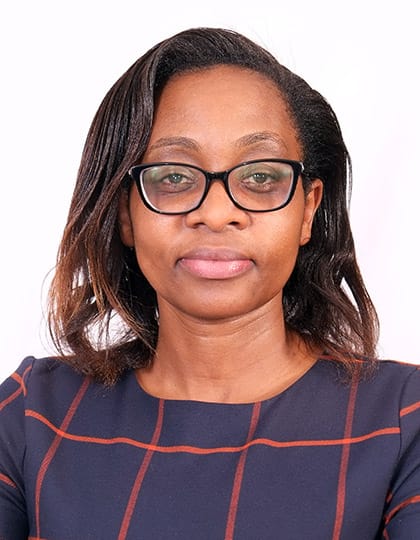
Dr. Lydia Kaduka
Dr. Kaduka is an Assistant Principal Research Scientist at Centre for Public Health Research in KEMRI. Her formal doctoral training is in Medical Biochemistry and post-doc in Healthcare Management. She has largely focused on NCDs, and stroke & cardiovascular diseases in particular. She has served as PI/Co-PI/Co-investigator on numerous projects, and marshaled and led research teams, mentored young investigators, and provided scientific direction in her line of work
Presently she serves as PI on a joint Medical Research Council (MRC, Cambridge, UK) – National Research Foundation (NRF, Nairobi, Kenya) Newton grant entitled, “Strengthening Primary Care Systems for Prevention & Control of Cardiovascular Diseases in Kenya: Feasibility Study of Health Kiosks in Markets”. This is a system-led intervention study to improve the reach and sustainability of cardiovascular disease prevention and health promotion interventions in communities through market-based health kiosks, in an effort to address inequalities in health care access. She currently serves on the Kenya National CVD Technical Working Group, and Chairs the Kenya National CVD Research and Monitoring and Evaluation Sub-Committee.

Prof. Seeromanie Harding
Seeromanie Harding is Professor of Social Epidemiology at King’s College London. Her research focuses on inequalities in health over the life course, and participatory approaches to systems perspectives to engage with the complex socio-cultural-political contexts that drive health inequities. UK-based studies include those in London that are exploring how hairdressing salons and primary care can jointly promote early detection of cardiovascular disease and breast cancer among women living in deprived and ethnically dense neighbourhoods, the Healthy Eating and Active Lifestyles for Diabetes (HEAL-D) study in African and Caribbean communities, and the eLIXIR programme that links information from routine health records and blood samples from mothers and their children to explores the early origins of physical and mental health disorders. International studies include the CONTACT (Congregations Taking Action Against Non-Communicable Diseases) study in the Caribbean, Health Kiosks in community Markets (HEKIMA) study in Kenya, Xunati Uti study in Brazil, and the recently funded IMPlementation of a multisectoral programme to improve Indigenous Adolescent Mental health in Brazil and Dominica (IMPACT). These studies explore the embedding of community systems (e.g., places of worship, community markets, schools) into the primary care pathway for prevention and control of non-communicable diseases. Before joining King’s College, she led the Medical Research Council Ethnicity and Health Research Programme at the University of Glasgow. Whilst there she established the Determinants of Adolescent, now young Adults, Social well-being and Health (DASH) study, a London based longitudinal study of ~6000 ethnically diverse young people. Equity, interdisciplinarity and collaborative partnerships with communities, policy actors and practitioners are key anchors in these studies.
She is Joint Head of the Department of Population Health Sciences at King’s College London, based within the Faculty of Life Sciences & Medicine, School of Life Course & Population Sciences. Population health research is led by over 160 experts, with patients and the public, to better understand how we can improve population health. Strong interdisciplinary research groups of social scientists, clinicians, health informaticists, statisticians and health economists, capacity building of early career researchers, and global health are key strengths of the Department.
Co- Investigators
KEMRI: Dr. Joanna Olale, Mr. Erastus Muniu, Dr. Joseph Mutai
University of Nairobi: Dr. Boniface Oyugi, Prof. Elijah Ogola
Moi University: Dr. Chrispine Oduor
Strathmore University: Prof. Gilbert Kokwaro


